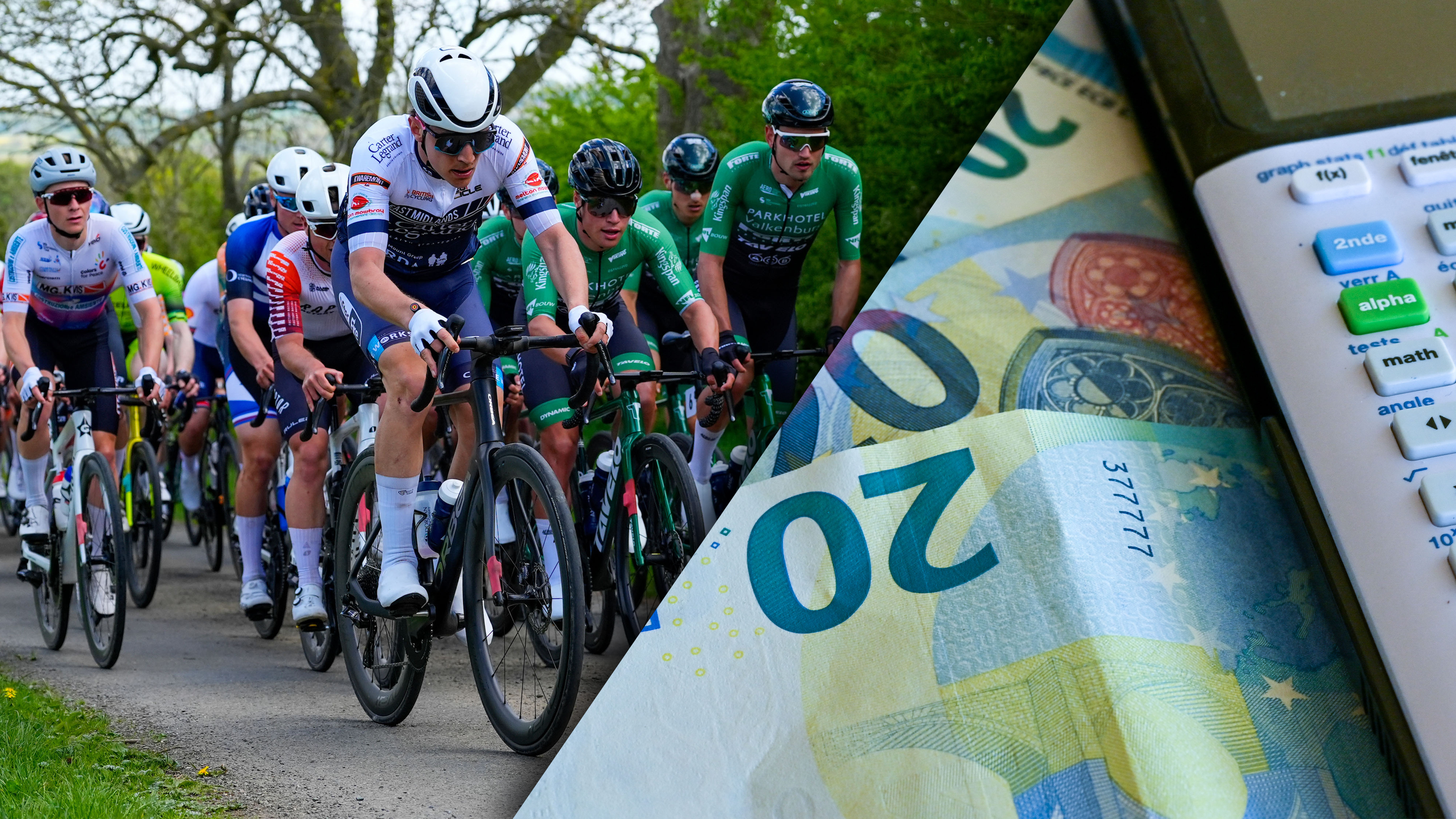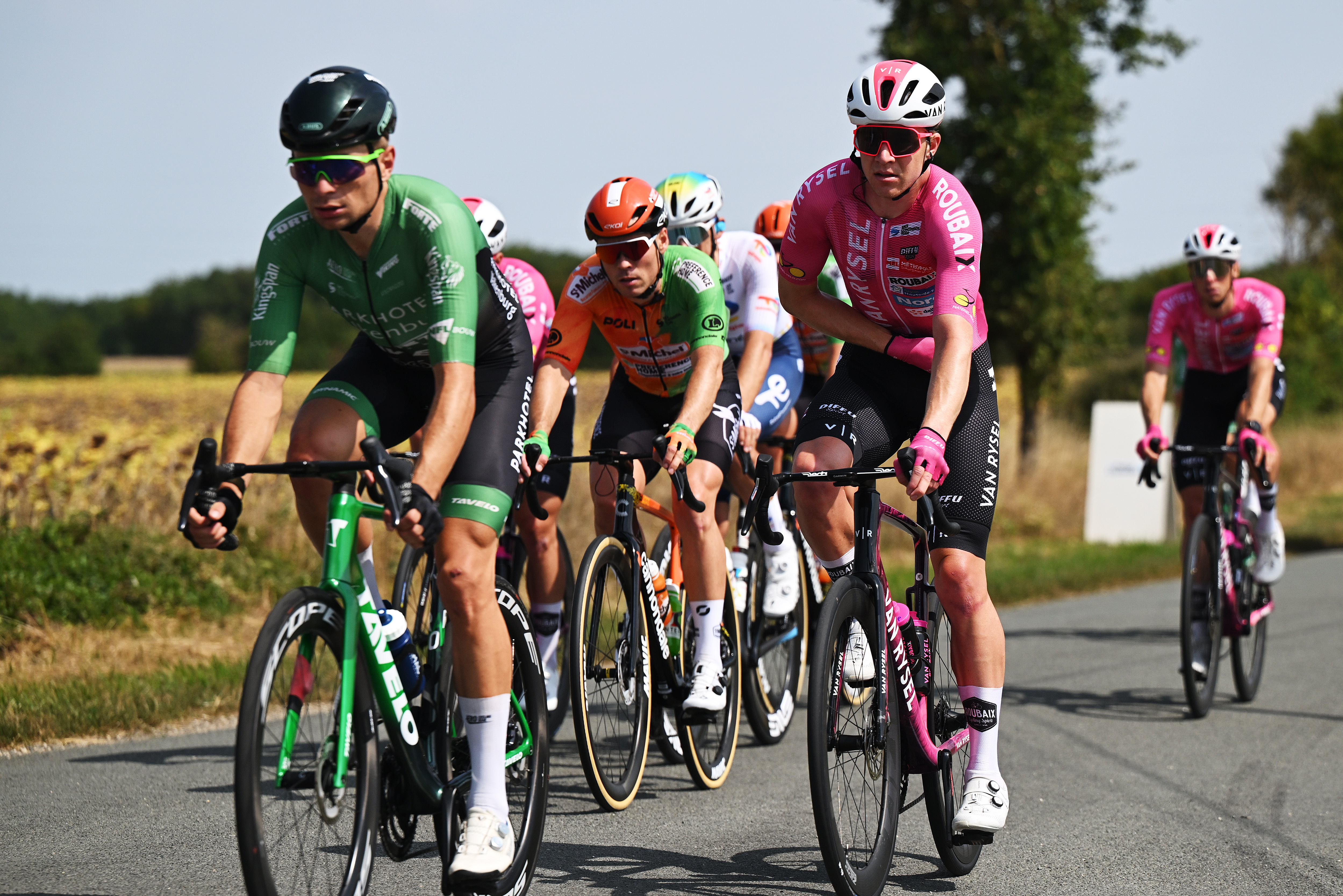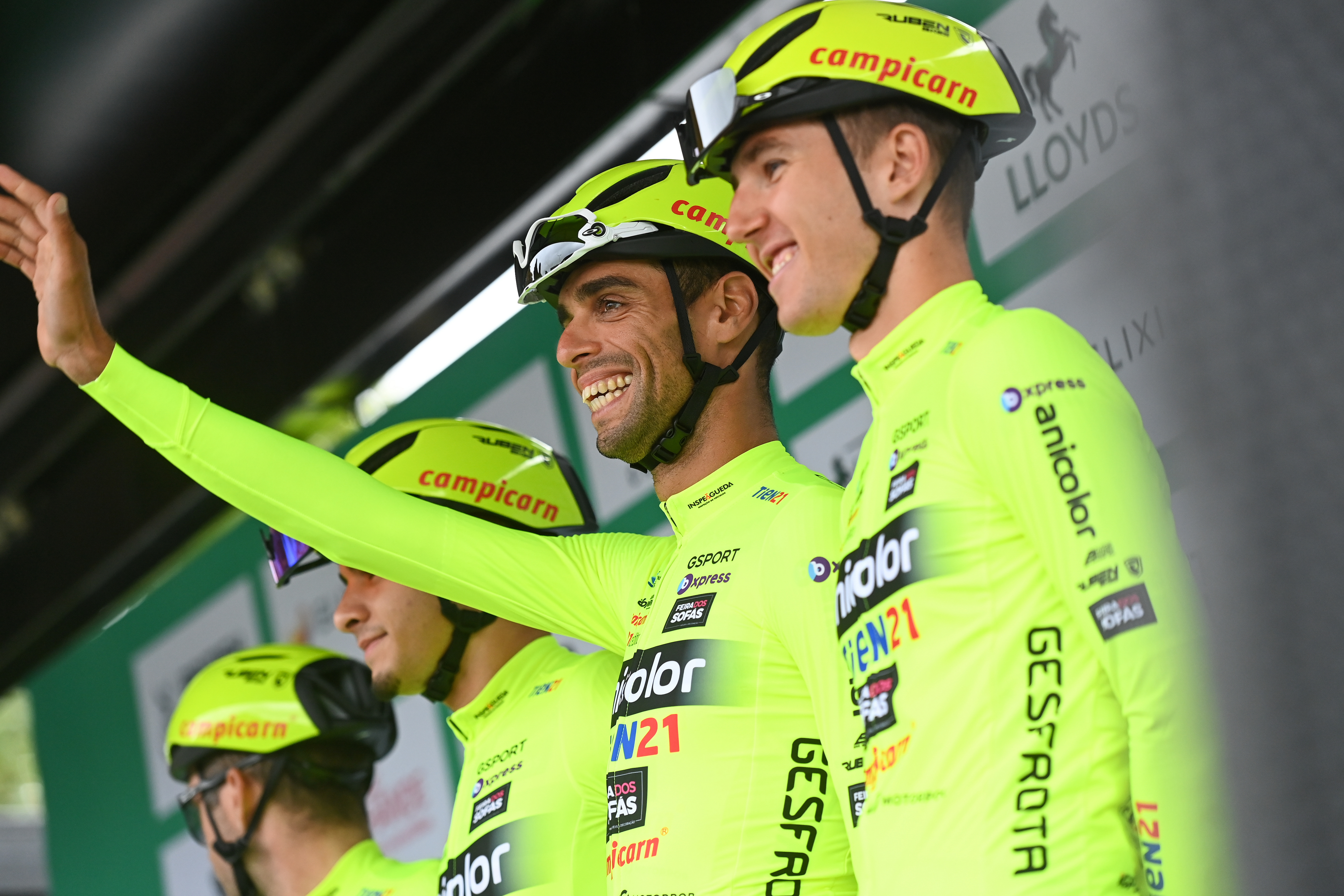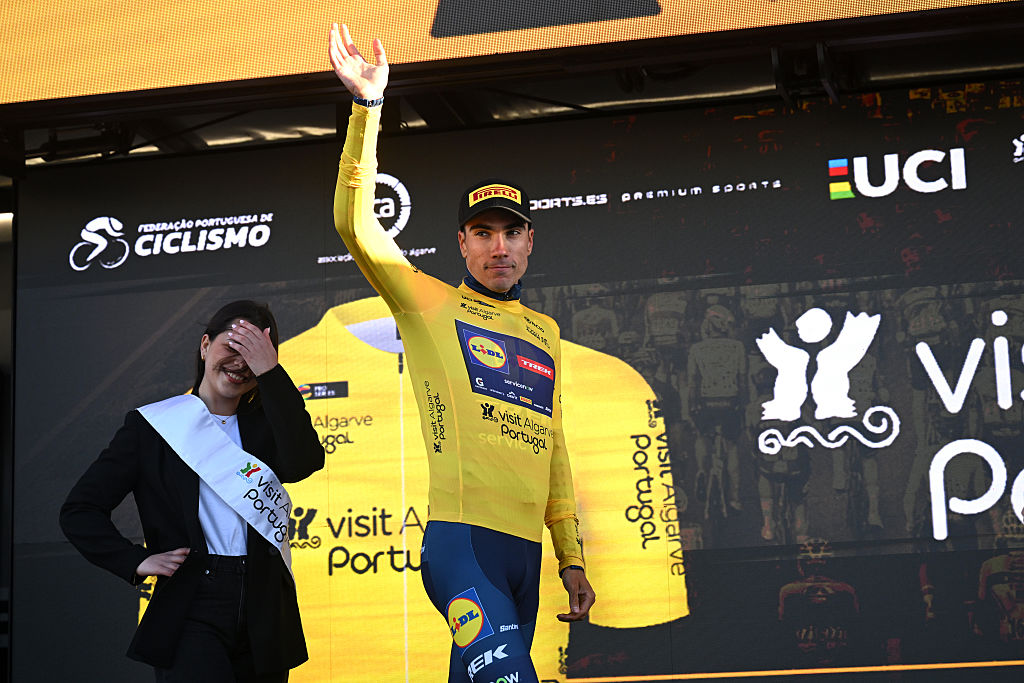Low wages, high expenses and questionable conditions – the unstable finances of Continental racing in men's cycling
Cyclingnews investigates life, money and racing in men's cycling's lowest – but biggest – UCI tier, where salaries are low but the desire to make it work is high

The latest race content, interviews, features, reviews and expert buying guides, direct to your inbox!
You are now subscribed
Your newsletter sign-up was successful
There has never been a better time to become rich from cycling, with an estimated 65 millionaires racing the world’s biggest races. But away from the heights of the Grand Tours and the Monuments are 178 third-division men’s UCI Continental teams, stacked full of riders trying to work their way up the ladder and veterans looking to extend their careers, all riding races with next to little fanfare. Million-Euro contracts are not a pipedream, but an impossibility – many of them essentially pay to race.
Cyclingnews has spoken with managers, riders and agents across the globe to understand the working conditions of male Continental riders in 2025. The third-tier is the breeding ground of many young talents – 17 professional teams now have their own Continental teams which operate as development squads – but there remains an overriding sense of desperate athletes, many of them students or working part-time jobs, being preyed upon, sucked into the trap of being promised a world that doesn’t exist.
“So many teams say that they have plans to be a [second-tier] ProTeam, but most of it is nonsense,” said one rider who wished to remain anonymous. “It comes from people who seem like legitimate businessmen, giving their speech to young riders who haven’t had the life lessons to know anything different. I often feel like riders are exploited for the love of sport and sold a dream that isn’t a reality. It’s really unfair.”
Bound by the rules
There are 91 registered Continental teams across Europe in 2025, with traditional cycling nations France (12) and Italy (10) boasting the most. Riders on third-tier teams will occasionally rub shoulders with riders from professional teams in lesser-ranked events, but they are not allowed to compete in WorldTour races – it’s for this reason that some races, like the Tour of Britain, have never applied for WorldTour status as then it would exclude the host country’s Continental teams.
Unlike with WorldTeam and ProTeam squads that are registered with the UCI, all Continental teams are regulated by their national federations. What that means is that they are bound by the rules of their respective countries, as opposed to the UCI. And that explains why wages and conditions vary greatly depending on the country.
In most Western European countries – the heartlands of cycling – there is a minimum wage that Continental teams have to pay their riders, as set by each national federation. In France, where riders are treated as professionals and not amateurs, the minimum salary in 2024 was €25,000; and in Belgium, it’s €24,674 for full-time riders, and €12,337 for riders under-25, students or those deemed as part-time employees. Not all federations make that amount publicly available, but Cyclingnews has been told that the figure in the Netherlands, which has eight teams, is €600 per month, and in Italy it’s closer to €300.
Of the several sources that Cyclingnews spoke to, the consensus was that riders on European Continental teams outside of France and Belgium are generally paid between €11,000 and €22,000 a year, with the mean salary being somewhere around €14-15,000. Development teams, which have grown in popularity and tend to scoop up the best young talent, will pay less – often not much more than €12,000.

French and Belgian Continental riders have some of the highest minimum salaries
Minimum wages in the 22 of the 27 European Union member states who have one range from €551 per month in Bulgaria to €2,704 in Luxembourg. The Netherlands, Germany, Belgium and France – countries with a combined total of 35 Continental teams – all have minimum monthly salaries between €1,802 and €2,193. Typical Continental cycling wages, then, are clearly inferior.
It wasn’t too long ago that top riders in Portugal – home to a thriving domestic scene, including the Volta a Portugal which is sometimes referred to as the ‘fourth Grand Tour’ – could command wages of between €60,000 and €70,000. Similarly, at the height of the UK scene between 2015 and 2019, the biggest names were said to be pocketing up to £50,000 a year, roughly the equivalent of €70,000 back then.
Those extraordinary amounts are partly to blame for the collapse of domestic UK racing, with the number of British Conti teams reducing from seven to zero. “That destroyed the British scene,” commented one rider who rode in the UK at the time. “They blew their budgets, and it wasn’t sustainable.”
One thing that hasn’t changed from a decade ago is that younger riders on teams not affiliated to professional outfits often race without being remunerated. “In Estonia, the minimum salary is around €800 a month, but in our team we have many youngsters who don't receive a salary,” said Mihkel Räim, of Quick Pro Team.
The 32-year-old has been racing mostly for Continental teams for the past 12 years, though he did ride in the WorldTour for Israel Start-Up Nation in 2020. “There is no rule we have to pay them, and they agree to that. They get expenses paid, of course, so we give them a bike, a place to live if they need it, food and prize money. This is the deal for most young riders on European teams.”

Some things are covered, other things are not
Expenses: Some things are covered, other things are not. British rider Harrison Wood, who spent two years at Cofidis until his release last season, is racing for one of Portugal’s nine Conti teams this year, Anicolor-Tien 21.
The 25-year-old earns around €12,000 a year, a minimum wage that “four to five riders on all the Portuguese teams will be getting,” he said. Highlighting just how tight finances are, though, Wood has had to secure three sponsors for the team to participate in the Tour of Britain.
“We lost a main sponsor at the start of the year, so we haven’t got the budget we anticipated,” he said. “Without the sponsors I got for the Tour of Britain, we wouldn’t have been able to make it to the start line.”
Wood always has his expenses covered when with the team, but he has to pay his own way to races – a policy that is common among most teams. On some teams, riders are given a set fee each month, often around €500, to cover their expenses. If there’s a shortfall, they have to pay it themselves.

Anicolor-Tien 21 and Wood did make it to the start line of the Tour of Britain Men
Many riders report issues with delayed wages or being reimbursed for expenses, and it’s not uncommon for money to be paid to a rider from different bank accounts, as teams scramble around to find the necessary amount.
One rider, who did not wish to be named, said that they had a “pile of receipts from this year of what the team owes me, plus prize money from races, but I have no idea when – or if – it’ll ever get paid.”
South African rider Callum Ormiston rode for the now-defunct Global 6 United team in 2023 and 2024. The team, which was first registered in New Zealand and then Luxembourg, had a number of serious financial problems, leading riders like Ormiston to seek out additional sources of income.
“I didn’t get paid at all by Global 6, so had to find personal sponsors throughout the year,” he said. “I had my flights paid for the year and hotels at races thanks to the organisers, but that was it. The rest of the travel I covered myself, and I bought my own food if we needed stuff. I only stayed because the calendar was good.”
'Word is spreading that there is good money to be made from racing in China'
Ormiston is now riding for The Hurricane & Thunder Cycling Team, one of 15 Continental teams in China. The country has a thriving and developing cycling scene, counting 13 UCI races and a strong domestic competition, the highlight being the China Pro Cycling League. “They’re throwing money at the sport and it's only going to keep on growing,” Ormiston predicted.
The situation in China for younger riders is similar to that in Europe: many will have their essential expenses covered, but won’t receive payment for riding. Older, more experienced and better riders, however, will get paid between €1,000 and €4,000 a month. The best in China are earning more than the minimum salary of ProTeam riders, which is set at €35,392 for employed riders, and €58,043 for self-employed riders. It’s little surprise that riders from across the globe are moving to China in increasing numbers.
“China is super cheap – you can have a good meal for €1-€2 – so I’m able to save most of my wages. Word is spreading that there is good money to be made from racing there,” Ormiston said. “The racing is also really good – the Pro League is strong, and there’s loads of UCI races. It’s the first time I’ve really felt like a professional rider.”
Prize money is also good. Räim and the Estonian-registered team Quick Pro have a Chinese backer and therefore race frequently in Asia. “We raced the Trans-Himalaya [in August] and you got $5,000 USD for a stage win, and $20,000 USD for winning the GC,” Räim said. “That’s way better in Europe, where you basically pay to race. If you win, you might get €800, but after tax, UCI fees, and splitting it with other riders, you might only get €100. which is honestly nothing nowadays in Europe.”

Räim cautions against the idea, though, of Chinese teams being willing to pay over the odds. “The prize money is good, and they have money to spend, but they don’t waste it,” he said. “It’s not a paradise. Some guys are on €4,000 a month, but not many guys get that type of money. You get some riders who have been on ProTeams asking for minimum WorldTour salaries but they’re not going to receive that.”
In total, there are 61 Continental teams in Asia and Oceania, with Japan (10) and South Korea (6) being the other hotspots. There are seven African teams and 19 teams in the Americas, but it is China that is making the biggest moves and attempting to take a slice of the European-dominated pie. “I think in the next five years it’s going to get even bigger,” Räim said.
Impressive racing calendar pitted against low wages
As the 2025 season nears its completion and preparations for the next one start to begin, the outlook for riders on Continental teams in most countries, with the exception of France and Belgium where there are more stringent labour laws, is unlikely to differ too much.
By agreeing to ride for third division teams, a rider is taking advantage of a potentially impressive racing calendar that pits them against professional riders, while accepting a life of low wages and very possibly even dipping into their own savings to get by. It’s certainly not an existence that promises wealth.
“You’re constantly battling to keep your head above the water, and it can have a serious mental toll on you,” one rider said. “For many years, it was definitely costing me more than I was making.”
Räim would like to see the UCI enforce a ruling on each of its national federations to instigate a minimum salary policy, but he has little faith it’d ever happen.
“It’s unfair because we’re in the same race, riding the same kilometres, and have the same risks as ProTeam or WorldTour guys. OK, one might be a superstar who is better, but a job is a job,” he said. “It would be nice if one day all Conti guys got at least something, but I don’t see it happening, not with the prices of everything going up. It’s never been harder to run a Conti team.”
You must confirm your public display name before commenting
Please logout and then login again, you will then be prompted to enter your display name.
